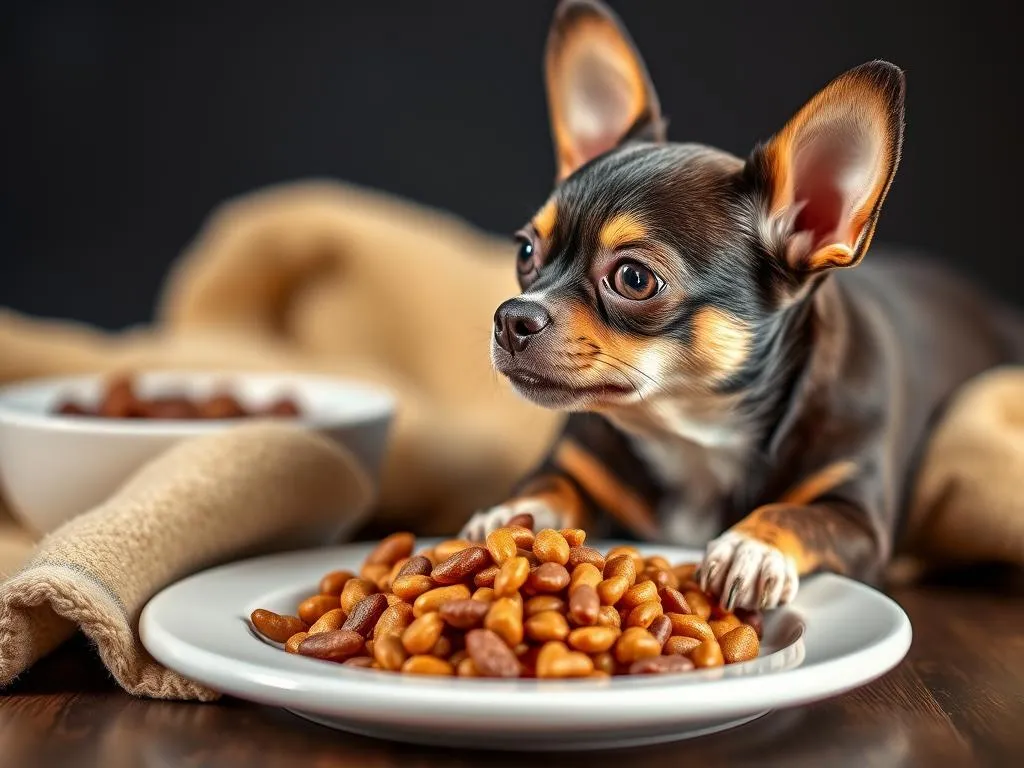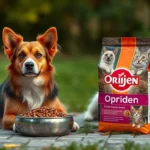
Introduction
Proper nutrition is essential for puppies to grow healthy and strong. For tiny breeds like Chihuahuas, the right diet is even more crucial due to their unique physiological needs. Chihuahuas are known for their small size and lively personalities, but they also have specific dietary requirements that must be met to ensure optimal growth and health. This article will delve into the best puppy food for Chihuahuas, highlighting their nutritional requirements and what ingredients to prioritize and avoid.
Understanding Chihuahua Nutrition
Nutritional Requirements for Puppies
Puppies require a balanced diet rich in essential nutrients to support their rapid growth and development. The primary components of their diet should include:
- Proteins: Essential for muscle development and overall growth.
- Fats: Provide energy and support brain development.
- Carbohydrates: Offer energy while promoting digestive health.
- Vitamins and Minerals: Crucial for various bodily functions, including immune health and bone development.
For growing puppies, caloric needs are significantly higher than for adult dogs. They require a diet that can meet their energy demands to support their active lifestyle.
Unique Dietary Needs of Chihuahuas
Chihuahuas, being one of the smallest dog breeds, have distinct nutritional needs. Their small size means they have a faster metabolism, requiring a diet that is rich in calories but low in bulk. Additionally, Chihuahuas are prone to certain health issues, such as:
- Dental Problems: Their small mouths can lead to overcrowded teeth, making dental health a significant concern.
- Heart Conditions: Chihuahuas are more susceptible to heart problems, necessitating a diet that supports cardiovascular health.
Understanding these unique needs is vital for selecting the best puppy food for Chihuahuas.
Key Ingredients to Look For
High-Quality Proteins
Animal-based proteins are the cornerstone of a Chihuahua puppy’s diet. They are vital for muscle growth and overall health. Look for puppy foods that list high-quality protein sources as the first ingredient, such as:
- Chicken
- Fish
- Lamb
These proteins not only support growth but also provide essential amino acids that contribute to a healthy immune system.
Healthy Fats
Fats are essential for providing energy and supporting brain development. Healthy fat sources to look for include:
- Fish Oil: Rich in Omega-3 fatty acids, which promote a healthy coat and skin.
- Chicken Fat: Provides concentrated energy and supports overall health.
A balanced amount of healthy fats in the diet can help your Chihuahua puppy thrive.
Carbohydrates and Fiber
While proteins and fats are crucial, carbohydrates also play an important role in a puppy’s diet. Easily digestible carbohydrates and fiber contribute to gastrointestinal health. Ideal sources include:
- Brown Rice: A good source of energy that is easy to digest.
- Sweet Potatoes: High in vitamins and fiber, promoting digestive health.
- Peas: Provide additional protein and fiber.
These ingredients help maintain a healthy digestive system, which is particularly important for small breeds.
Vitamins and Minerals
A well-rounded diet must include essential vitamins and minerals. Look for puppy foods fortified with:
- Calcium and Phosphorus: Important for bone development and strength.
- Vitamins A, D, and E: Support overall health, from vision to immune function.
A balanced mix of these nutrients ensures that your Chihuahua puppy is getting the comprehensive nutrition they need.
What to Avoid in Puppy Food
Fillers and By-products
When selecting the best puppy food for Chihuahuas, it’s essential to avoid foods that contain fillers like corn and soy. These ingredients provide minimal nutritional value and can lead to weight gain without the necessary nutrients. Additionally, by-products from meat can be harmful, as they often lack the quality and nutrition found in whole meats.
Artificial Additives
Many commercial dog foods contain artificial colors, flavors, and preservatives. These additives can be detrimental to your puppy’s health, leading to allergies or other health problems. Opt for foods that prioritize natural ingredients, which are generally healthier and better for your Chihuahua’s long-term wellbeing.
Common Allergens
Chihuahuas can be prone to food allergies, so it’s crucial to avoid common allergens such as:
- Wheat
- Dairy
These ingredients can trigger allergic reactions, leading to symptoms like itching, digestive issues, and more. Always consult with your veterinarian if you suspect your puppy may have food allergies.
Top Recommended Puppy Foods for Chihuahuas
Brand Comparisons
When it comes to selecting the best puppy food for Chihuahuas, several brands stand out for their quality and nutritional offerings. Here are some top contenders:
- Royal Canin Chihuahua Puppy: Specifically formulated for Chihuahuas, this food contains a precise blend of nutrients tailored to their needs.
- Hill’s Science Diet Puppy Small Paws: Offers high-quality protein and a blend of antioxidants to support a growing puppy’s immune system.
- Wellness CORE Grain-Free Puppy: A protein-rich formula that is grain-free and made with high-quality ingredients.
Product Reviews
- Royal Canin Chihuahua Puppy
- Ingredients: Chicken by-product meal, corn, wheat gluten, animal fat.
- Benefits: Tailored to the small jaws of Chihuahuas; promotes dental health.
-
Customer Feedback: Many owners report improved coat health and energy levels.
-
Hill’s Science Diet Puppy Small Paws
- Ingredients: Chicken, whole grain wheat, corn gluten meal.
- Benefits: Supports healthy brain and eye development.
-
Customer Feedback: Owners appreciate the digestibility and the fact that puppies love the taste.
-
Wellness CORE Grain-Free Puppy
- Ingredients: Deboned chicken, chicken meal, peas, potatoes.
- Benefits: High in protein and grain-free, ideal for puppies with sensitive stomachs.
- Customer Feedback: Many pet parents note increased energy and vitality.
Comparison Chart
| Brand | Key Features | Pros | Cons |
|---|---|---|---|
| Royal Canin Chihuahua Puppy | Tailored for Chihuahuas | Promotes dental health | Higher price point |
| Hill’s Science Diet Puppy | Antioxidant-rich | Supports cognitive development | Contains grains |
| Wellness CORE Grain-Free Puppy | High protein, grain-free | Ideal for sensitive stomachs | Limited availability |
Feeding Guidelines for Chihuahua Puppies
Portion Sizes
To ensure your Chihuahua puppy is getting the right amount of nutrition, it’s important to follow recommended serving sizes based on their age and weight. A general guideline is:
- Puppies aged 8-12 weeks: 1/4 to 1/2 cup per day, divided into 3-4 meals.
- Puppies aged 3-6 months: 1/2 to 1 cup per day, divided into 2-3 meals.
- Puppies 6 months and older: Transition to adult food around 12 months of age.
Measuring food accurately can help prevent overfeeding or underfeeding.
Feeding Schedule
Establishing a consistent feeding schedule is essential for your Chihuahua’s wellbeing. Puppies thrive on routine, so aim to feed them at the same times each day. As they grow, you can transition them to two meals a day.
Monitoring Health and Weight
Regularly monitor your Chihuahua’s weight and overall health. Look for signs of overfeeding, such as difficulty in moving or lethargy, and signs of underfeeding, such as excessive hunger or weight loss. Consulting with your veterinarian can help determine the ideal weight range for your specific Chihuahua.
Conclusion
Selecting the right puppy food for Chihuahuas is crucial for their growth and long-term health. By focusing on high-quality ingredients, understanding their unique dietary needs, and avoiding harmful additives, you can foster a healthy diet that supports their vibrant lifestyle. Always consult with a veterinarian to tailor dietary choices to your puppy’s specific needs, ensuring they thrive as they grow.
Frequently Asked Questions (FAQs)
How much should I feed my Chihuahua puppy?
The amount varies depending on their age and weight. Generally, between 1/4 to 1 cup per day, divided into multiple meals.
Can I mix wet and dry food for my puppy?
Yes, mixing both can provide variety and enhance palatability, but ensure the total caloric intake matches their nutritional needs.
What are the signs of food allergies in Chihuahuas?
Common signs include itching, digestive upset, and skin irritations. Consult your vet for advice.
Should I consider homemade puppy food?
While homemade food can be beneficial, it’s important to ensure it meets all nutritional requirements. Consult a veterinarian before making any changes.
How can I ensure my puppy is getting a balanced diet?
Choose high-quality puppy food, monitor their weight, and consult a veterinarian for tailored dietary advice.
With a solid understanding of Chihuahua nutrition and the best puppy food for Chihuahuas, you are now equipped to make informed choices that will support your furry friend’s health and happiness.









